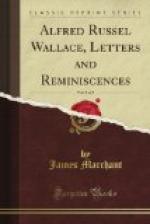Congratulations on Presidency of the Entomological Society.
A.R. WALLACE.
* * * * *
TO PROF. POULTON
Parkstone, Dorset. March 15, 1895.
My dear Poulton,—I have now nearly finished reading Romanes, but do not find it very convincing. There is a large amount of special pleading. On two points only I feel myself hit. My doubt that Darwin really meant that all the individuals of a species could be similarly modified without selection is evidently wrong, as he adduces other quotations which I had overlooked. The other point is, that my suggested explanation of sexual ornaments gives away my case as to the utility of all specific characters. It certainly does as it stands, but I now believe, and should have added, that all these ornaments, where they differ from species to species, are also recognition characters, and as such were rendered stable by Natural Selection from their first appearance.
I rather doubt the view you state, and which Gulick and Romanes make much of, that a portion of a species, separated from the main body, will have a different average of characters, unless they are a local race which has already been somewhat selected. The large amount of variation, and the regularity of the curve of variation, whenever about 50 or 100 individuals are measured in the same locality, shows that the bulk of a species are similar in amount of variation everywhere. But when a portion of a species begins to be modified in adaptation to new conditions, distinction of some kind is essential, and therefore any slight difference would be increased by selection. I see no reason to believe that species (usually) have been isolated first and modified afterwards, but rather that new species usually arise from species which have a wide range, and in different areas need somewhat different characters and habits. Then distinctness arises both by adaptation and by development of recognition marks to minimise intercrossing.
I wonder Darwin did not see that if the unknown “constant causes” he supposes can modify all the individuals of a species, either indifferently, usefully, or hurtfully, and that these characters so produced are, as Romanes says, very, very numerous in all species, and are sometimes the only specific characters, then the Neo-Lamarckians are quite right in putting Natural Selection as a very secondary and subordinate influence, since all it has to do is to weed out the hurtful variations.




